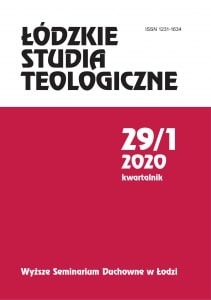Obrona chrześcijańskich korzeni Unii Europejskiej w świetle Deklaracji Schumana 2017
Defense of Christian roots of the European Union in light of the Schuman Declaration 2017
Author(s): Rafał EstkowskiSubject(s): Theology and Religion
Published by: Wyższe Seminarium Duchowne w Łodzi
Keywords: Schuman Declaration; European Union; European community; Christian values; freedom; solidarity; tolerance; patriotism; ethical criteria
Summary/Abstract: This article is an attempt to assess on theological grounds a document which was published by a group of intellectuals gathered in the Shuman Thought Institute Shuman Declaration 2017. The content and composition of this article is closely related to the contents of this document. The author in subsequent parts refers to the issues presented in this declaration. He focuses on one-sided and instrumental application in the 2017 Declaration. The fact of Brexit and the establishment of the European Union pursuant to the Treaty of Maastricht in its present shape were used by the authors of the document as an argument supporting the thesis about the necessity of returning to Christian roots. In the part “Pillars” the author made a critical analysis on theological grounds of the basic criteria, which according to the authors of “Schuman Declaration 2017”, should guide the creators of the EU law. At the same time he reminds about other Christian criteria which have not been mentioned there such as freedom or solidarity. In a part “Appeal and changes directions” he analyzed demands and guidelines concerning the directions of changes which were expressed by intellectuals from the Schuman Thought Center, which should become the tool to be used to make the European legislation return to Christian values as the supreme aim, which is at the foundation of the document published by them. In this part we made an analysis and we can find the author’s objection concerning omitting the issue of tolerance from among the most important change direction together with the explanation how it should be understood in light of Christian ethos. According to the author the document has some deficits in the area of arguments and interpretation. Those deficits can be interpreted by political adversaries in a negative way as its weakness. According to the author due to them such a significant and necessary document will not be noticed and in many European environments it can be ignored or simply omitted.
Journal: Łódzkie Studia Teologiczne
- Issue Year: 29/2020
- Issue No: 1
- Page Range: 83-96
- Page Count: 14
- Language: Polish

